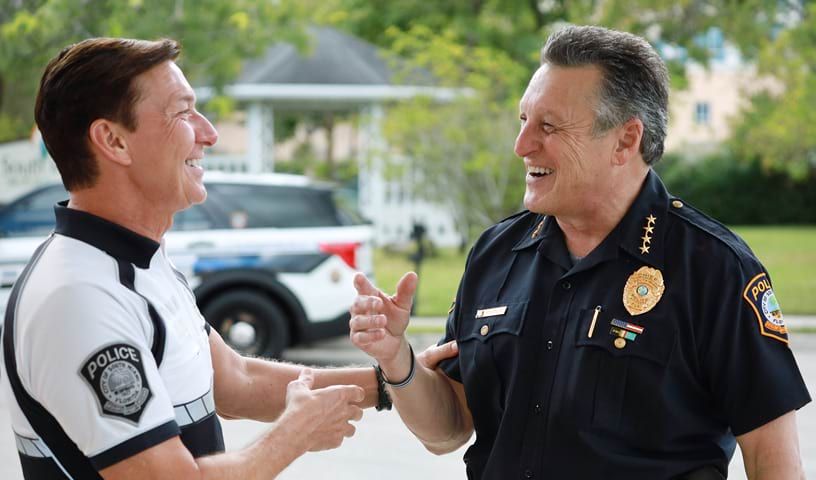Family support and its long-lasting impact on first responder wellness
April 8, 2024

Over the past decade, there has been a significant shift in the landscape of first responder support, moving away from the traditional “suck it up” culture of previous decades. Agencies nationwide are now prioritizing trauma education, healthy coping mechanisms, and overall wellness throughout first responders’ careers. Yet, despite the availability of such resources as peer support, psychological services and wellness units, agencies often struggle to address trauma effectively or mitigate employee issues and suicides. The question arises: Are we doing enough?
The answer lies in expanding support to include families of first responders, facilitating easier access to resources and building trust within the first responder community. Family support goes beyond mere rhetoric. It's about focusing on the well-being of first responders outside of work and strengthening their support systems. Some agencies may initially struggle to see the correlation between hosting events like a Police Department Movie Night and first responders seeking out services. But these events serve as vital bridges to build trust and connections with available resources. Hosting events gives agencies a tangible opportunity to ensure resources reach those who need them most. These gatherings foster an environment of trust, encouraging first responders to use available support services without hesitation.
Enabling connections
Family support initiatives play a pivotal role in facilitating connections between the families of first responders and the resources available to them. By creating spaces for families and first responders to come together, agencies can bridge gaps and ensure support is readily accessible when responders need it most. Tailoring family support initiatives to meet the unique needs of each agency and its personnel is essential to ensuring their effectiveness. Whether a first responder's primary support system consists of their parents, friends, partner, or spouse, it is imperative for the agency to meet them where they are in life. As the founder of Beyond the Badge LLC – a non-profit that provides wellness resources and family support to first responder agencies – I suggest three key pillars to build effective family support. These are connection, education, and preparation. By prioritizing these pillars, agencies can make a significant impact with modest budgets. Examples of family support initiatives for these three pillars include:
- Connection:
- Spouse dinners to facilitate connections among spouses of first responders
- Date nights to provide opportunities for first responder couples to bond
- Recreational activities that allow responders to decompress and build relationships
- Holiday events that can include movie nights, meals for on-duty staff, meals for staff who do not have family in the state and Adopt-A-Cop events that provide gifts for struggling officers or officers without families
- Education:
- Financial education to address the common stressor of financial concerns
- Relationship education to offer support for managing relationship stressors
- Job education for support systems to educate families about the realities of first responder roles and help minimize frustration and resentment
- Preparation:
- Critical incident preparation to provide families training to better prepare them for potential crises
- Line-of-death and suicide training that equips families and responders with the tools to navigate challenging situations
Providing structure
Consistency is paramount when it comes to providing family support. For agencies to truly make an impact, they must offer training or events on a regular basis, at least quarterly. Ideally, agencies should host these events bi-monthly, monthly, or even multiple times a month. Agencies can explore partnerships with local businesses or non-profit organizations to expand their budget for family support initiatives. Hosting events can be surprisingly affordable, with costs averaging from $4,000 to $10,000 a year. Indeed, a larger budget for family support initiatives can significantly amplify their impact. With more financial resources, agencies can expand the scope of their programs, host a greater variety of events, provide more comprehensive training, and reach a wider audience of first responders and their families. Additionally, a larger budget allows for more extensive partnerships with community organizations, which can further enhance the reach and effectiveness of family support efforts. Overall, investing in family support with a substantial budget can lead to greater resilience, stronger relationships, and improved well-being for first responders and their families.
Implementing family support initiatives yields numerous benefits, including stronger, more resilient families and first responders. Moreover, agencies stand to gain significantly in terms of culture, retention, recruiting, and resilience.
Alicia is the founder of Beyond the Badge LLC and 501c3 that provides wellness resources and family support to first responder agencies. Alicia began her career as a Denver cadet, a dispatcher, a deputy sheriff and was the Aurora Police Department Family Liaison. Alicia is currently the Family Support Coordinator for Douglas County Sheriff’s Office in Colorado. Alicia is also married to a Douglas County Sheriff’s Detective and is the daughter of a now retired Denver Police Department Lieutenant.
Connect with Alicia on LinkedIn:
https://www.linkedin.com/in/aliciaromero8432 or through her website at: https://www.beyondthebadgesupport.com
